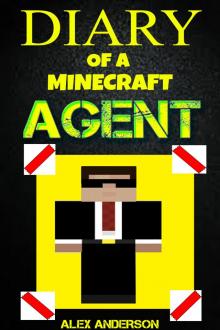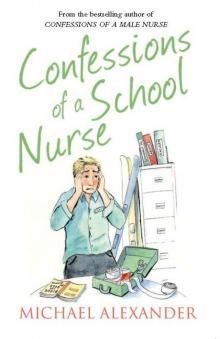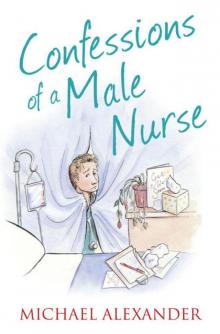- Home
- Michael Alexander
Confessions of a Male Nurse Page 9
Confessions of a Male Nurse Read online
Page 9
Stephanie, Dr Brown and Kasha made to exit the room.
‘Is there anything you need before we go?’ Stephanie asked.
After Kasha translated, Jan shook his head. I got off the bed and looked at Stephanie, my eyes pleading don’t leave me here.
Ever-observant, Stephanie asked Jan if he wanted me to stay.
Jan looked at me.
‘Yes,’ Jan replied in English.
Just before Kasha left the room she pulled me aside.
‘He understands a lot more English than you think. Stay with him. He likes you, and he shouldn’t be alone right now.’
What does one do with a yellow-tinted, Polish teenager who knows a little English, and has just been told he may die within the year? You sit in silence because there is nothing to say. Even if there was, I couldn’t be sure exactly how much he would have understood. I got off the bed and turned on the television. I sat with my eyes glued to the screen, waiting for him to make the first move.
‘Do you have girlfriend?’ he asked me.
His question caught me off guard. ‘No. No one will have me.’
I guess he understood because he managed a small smile.
‘Do you have one?’ I asked in return. He shook his head and managed a small chuckle.
‘Not get girlfriend now. Not this colour.’
It was a clever remark, but I didn’t find it amusing. I pictured myself in his position, away from all my family, counting my life in months, weeks, days; I’m sure I would never laugh again. Maybe Jan was being brave for my sake. Maybe he needed to be alone after all, so he could let it all out: cry, howl, scream, punch, hit, slam something.
I considered leaving, but then wondered if it might have been me that had the problem?
I’d never been in this situation before. Until then everyone who had died or was expected to die had been old. It was always sad, often unfair and it could be heartbreaking, but it was more acceptable than this, and was easier to cope with.
‘It’s okay,’ Jan said to me. ‘It’s okay.’
What was he talking about? I got the feeling he was trying to reassure me. Was I being that transparent?
Jan turned his attention to his bedside cabinet; he pulled out a small stack of magazines, and handed me one from the top.
‘Good shit,’ he said.
I was holding a porn magazine.
The next hour was one of the most unusual of my life. A young Polish man with limited English and a New Zealander with a dreadful, drawling accent tried to rate the talent of each woman on display. When I eventually left I felt, if not exactly happy, at least a little more at peace with the world.
So far, in the few months that I’d been working in London, I had worked with people from all over the world. And, it didn’t matter whether people were from deepest Africa, Norway, South America, or any place in between, if a person had a sense of humour, it could make a bad day, good.
Magic medicine
‘You won’t be having any patients,’ said a tall blonde nurse.
Her name was Susan and she seemed very serious. I suppose that wasn’t surprising considering the area she worked in.
‘It’s not that we don’t trust your abilities as a nurse, but we don’t know you and this is a very specialised area. We can’t afford to get things wrong here.’
I nodded my head, and kept a solemn expression on my face. Some nurses might have been offended by being told this, but I took a different view. In fact I couldn’t think of a better job; no patients and a full day’s pay. I made a mental note to thank Tracy back at the agency for setting me up with this one.
‘Fine with me, I’m just here to help out – but what exactly do you want me to do then?’
‘We need someone to regularly check everyone’s observations, their pulse, temp and blood pressure every hour. The patients here can become very unwell very quickly. Is this okay with you?’
I nodded my head.
‘Do you have any questions?’
I was worried about how ignorant I would sound, but I had a few that I felt I really did have to ask.
‘Susan, this is all very new to me. I mean I’ve heard of heart transplants, lung, liver and kidney transplants, but I don’t know the faintest thing about bone marrow transplants. I don’t even know what sort of things I need to watch out for.’
I was given a quick rundown of cancers of the blood, or in more medical terms, leukaemia. I was also reminded of how susceptible a leukaemia patient is to infection, because the body has very few white blood cells left to defend it.
‘Whatever you do, don’t be afraid to ask for help,’ were Susan’s last words.
‘I’ll be careful,’ I promised as I headed towards room 1 and cautiously opened the door leading into the first patient’s room.
‘STOP! Don’t use that door,’ a voice yelled out at me.
I turned around to see Susan gesturing to another door.
‘Never walk directly into a room, always use the side room. And always wash your hands and put on a gown.’
I had been wondering why all the rooms seemed to have so many doors.
‘Sorry, won’t happen again,’ I said. I hurriedly shut the door, then headed into the side room to prepare for entry.
By the time I had washed, gowned, gloved and masked up, I was becoming a little worried at what I would find in the room. Exactly how sick was the patient going to be? I peered in through the small window in the door to get a look at the occupant, Mr Tait.
I’d seen some terrible sights in the few short years I’d been nursing, but the sight of Mr Tait’s face made me panic – I was certain I was staring into the face of death. His cheeks were grossly sunken and hollowed, the bags under his closed eyes stretched down to his cheeks. His skull was emaciated and his skin was a greenish yellow. My eyes wandered down his body to his chest, where I was looking for movement. I eventually saw some, a very slight rise that told me he was still alive.
Mr Tait’s eyes opened and he briefly glanced in my direction then closed them again.
‘Water,’ he rasped.
There was a jug and an empty glass in front of him. He didn’t have the strength to pour for himself so I made myself useful. A thin arm reached out and clasped the glass, then slowly, almost painfully, brought it to his lips. He took his first sip.
‘Arrrgh.’ His sudden cry literally made me jump.
He glanced up at me again and grimaced… no, it wasn’t a grimace, he was smiling.
‘I look like shit and I feel even worse,’ he said to me. ‘I would give anything to take away the pain.’
My second lesson of the day: bone marrow transfusions are painful.
‘Where’s the pain?’ I asked, trying to figure out where it could possibly be. The whole body perhaps? Or maybe deep down in his bones?
‘My mouth,’ he answered.
‘Your mouth? What’s wrong with your mouth?’
He opened up as wide as he could, and I brought my face close to get a good look. His mouth was a mass of raw, red ulcers, some of which oozed. I pulled back suddenly, trying to make it look as casual as possible.
It seemed Mr Tait could read me like a book: ‘It’s a side effect of the treatment; they have special medicine for me. Go get me some,’ he ordered.
I didn’t question him and went in search of Susan. I caught up with her in the treatment room.
‘Everything okay?’ she asked.
‘Well, yeah, I suppose. But Mr Tait’s asking for something for his ulcers. He said there’s a special medicine?’ I explained.
‘Oh, that’s no problem. Here, take this. This is the mouthwash he’s talking about.’
I looked at the label on the bottle of liquid in my hand.
‘Ah Susan, are you sure this is right? You want me to give him this as a mouthwash?’
It was unlike any treatment I had ever used – or even heard of being used – in this way before.
‘Sure, it’s no problem. We use this all t
he time. We go through heaps of the stuff.’
Mr Tait wasted no time in ordering me to pour him a generous portion.
His drug chart said between five and ten mls, as often as required. He requested ten.
As I poured, I worried what sort of side effect he could experience.
‘Um, aren’t you supposed to spit it out?’ I asked Mr Tait as instead of spitting out the mouthwash he swallowed it.
‘No,’ was his monosyllabic reply. He then ordered me to pour another ten mls, which he again swallowed.
The next patient I saw was Mr Henry. He didn’t look anywhere near as ill as Mr Tait, but he too had some very nasty mouth ulcers.
‘Can you get me some of the mouthwash, they’re really bad today?’ he asked me as I sat there measuring his observations.
The scene with Mr Tait was repeated.
When I again questioned the swallowing of the medicine, he sounded a trifle offended: ‘Of course not. Don’t be ridiculous. If you ever end up like me, and I pray you never, you will understand.’
I quickly left the room.
‘I understand that your mouth ulcers are particularly painful today, Mr Johnson,’ I said.
‘Worst they’ve been for quite some time,’ he said, as he showed me just how bad they looked.
I was steadily becoming suspicious but I didn’t want to upset another patient and I repeated the cycle again, except this time I refrained from saying anything when he didn’t spit out the mouthwash.
The ward had a total of 12 patients and out of those 12, eight had requested mouthwash and five had swallowed it. An hour had gone by and I was back in Mr Tait’s room to check his observations again.
‘Good to see you again,’ said Mr Tait when I walked back in.
Well, he certainly seemed a bit brighter than before.
‘You’re new here. How you finding it?’ Mr Tait still sounded terrible, but he was definitely a bit brighter. I left Mr Tait’s room with a nagging feeling that I had messed up. I could only hope no one noticed.
Susan caught up with me before I had a chance to check on Mr Henry.
‘The patients seem very cheerful this morning,’ she said to me. I had a sinking feeling in my stomach.
‘I notice on the drug chart that quite a number of patients have had mouthwash; more than normal, in fact. Have you been making sure the patients spit out their mouthwash?’ she asked me. ‘After all it is hospital quality cocaine they’re using,’ she added.
I shook my head.
‘Don’t believe them, if they tell you they’re supposed to swallow it. They try it on with all the new staff.’
Susan left the matter at that, although I swear I could see a hint of a smile at the corners of her lips.
That was the first time I’d seen cocaine used in hospital. In this case, it was the best medicine for the terrible ulcers that are a common side effect of the treatment these patients receive. Apparently nothing works as well as cocaine mouthwash. The medicine is not to be swallowed, but the dosage is actually very small, so no harm done if they do.
A different world
After my first year of nursing in London I knew which wards, or even hospitals, to avoid, as well as knowing which hospitals and wards were great to work in. Fortunately, the nice places outnumbered the bad. But even in the places that I liked, I had to get used to a different style of nursing. Naturally there were always going to be differences in the system I had left behind in New Zealand to the British system.
1. The major difference was the patient to registered nurse (RN) ratio. I was used to working with one RN for every six patients. In the UK I often had 10 or 12 patients, with just one nurse assistant to help me.
2. I found it difficult to delegate tasks, especially the unpleasant ones, to a nurse assistant. I was used to doing it all, from the highly skilled stuff, to helping someone off of a commode. It was also hard knowing exactly what each assistant could do as it varied from place to place. I’d find myself doubling up on certain aspects of patient care, such as wound dressings, which some assistants would do, while others wouldn’t. Back home, I was used to one nurse assistant for the whole ward.
3. Another shock was working 12-hour shifts. Not all places in London scheduled like this, but most did. Back home I only ever worked an eight-hour shift, maximum. In the UK, if you did a run of three or more days, it sometimes felt like you practically lived at the hospital.
4. I find the small things can make a big difference, so the lack of wheelchair accessible showers in London was a real nuisance. I was used to any patient who could at least sit in a chair being washed in the shower, every day. In London, the few showers I saw in the wards were small, enclosed spaces, often with standing room only. I think this came about because when these hospitals were built, people didn’t shower, they bathed. It’s not possible to have all of your patients bathe every day. I soon felt I could never get my patients as clean as I would like.
5. I had an ongoing battle with the cleaners; the ones I encountered in London hospitals weren’t allowed to clean up vomit, or body fluids, and I wasn’t allowed to use their tools (mop and bucket); so, I’d end up wiping up vomit with a towel. I remember trying to open the cupboard where the cleaning equipment was stored, and finding it locked, with the cleaner refusing to open it for me. I don’t know exactly how much hospitals save by outsourcing their cleaners to a separate company, but the ones I met didn’t seem to take pride in their work.
6. Then there was the fact that London nursing was truly an international experience. There could easily be two, three, four or more nurses from different nationalities in a single ward, and it was sometimes a challenge to find common ground. Generally the care we provided was the best we could give with the resources we had, but occasionally I’d find things being done in a way that was completely the opposite of what I’d been taught.
7. I had developed some habits in the care of my post-operative patients that I struggled to keep up with in UK hospitals. I was used to all patients who came back from theatre having a complete bed-wash, linen and gown change that evening. I was not alone in not always getting this done, and I found other nurses who felt the same. It wasn’t always about the same thing, but a lot of the older nurses confided in me that they didn’t get the time to do all the basic things that they had been taught to do.
8. Another habit I had been forced to learn was to keep rooms spotless. I found it frustrating to find patients’ rooms cluttered with flowers, chairs, leftover cutlery, magazines, books, dentures, and that’s to name but a few things. Whenever I walked into a bombsite I was always reminded of how messy a nurse I used to be, until one day when this all changed. The nurse manager said I needed to be tidy, clear the surfaces, remove spare furniture, because it was a hazard for the night staff. She also said that if there were an emergency, people needed to be able to get into a room quickly. I turned up for work the next morning to find my patient had died, but the arrest team complimented the nurse (me) for having such a clean room, they hadn’t had to worry about knocking things over.
Highs and lows of temp nursing
I learnt very quickly that temp nursing is difficult. It wasn’t long before the disadvantages appeared to outweigh the advantages. In total I spent four years working in British hospitals. The first two were spent working as a relatively junior nurse on the wards, and after a four-year break back in New Zealand, I returned to London and spent two more years working as an experienced emergency room nurse.
Sometimes I’d spend no more than a day at any given hospital, but if I liked a specific place, or if the nurses in a particular ward liked me, I’d often end up with a line of work.
I’ve lost count of the different hospitals and wards I’ve been in, and although it became easier to adjust quickly to a new environment, it was always a challenge.
Highs:
1. I had some very interesting and unusual placements. These included walk-in STD clinics, teenage cancer units, and even sporting ev
ents. I ended up learning a little bit about a lot of different things.
2. I was always free to say no. If I didn’t like a place, I never had to go back.
3. I always earned more than the regular staff. If you had the training, and could get work in an emergency room or intensive care unit, the night shift paid £30 an hour for a 12-hour shift. You could take home a cool £1,200 after tax for a week’s work. But a 65-hour work week isn’t sustainable, and the few times I did this, I ended up taking most of the next week off.
4. If you are looking for a permanent job, then temping is a great way to find out which places you’d like to work in, before committing.
Lows:
1. Irregular hours can create havoc with your body. Being able to pick and choose your own work hours may sound great, but you’re not really as free as you might think. Work often had its peaks and troughs, and I could easily find myself working two days one week, and in a desperate bid to make up the hours I’d work five, or even six days, the next.
2. When going to a new place, I often felt like half my time was spent looking for equipment, trying to track down elusive doctors, looking for patient medications which never seemed to be on the drug trolley, figuring out which nurses I could turn to for help, or avoiding those who were hostile.
3. As for patient continuity, it doesn’t exist for the temp nurse, unless, of course, you get a regular line of work. Having no continuity is not only difficult for the nurse, it’s far from ideal for the patient.
4. It’s difficult as a temp nurse to figure out what your boundaries are. Some places would let me administer intravenous medications, others wouldn’t. Once I was even reprimanded for helping out with a bed sponge because that was the assistant’s job, and I was told there were more important things I should be taking care of.
5. It’s easy, however, to find yourself out of your depth. On several occasions I ended up in a placement that I did not have the skills for. This usually came about because the hospital desperately needed a physical body to fill a spot, and they’d take any registered nurse as a last resort.

 Woken
Woken_preview.jpg) Minecraft: Battle of Legends Book 1 (An Unofficial Minecraft Book)
Minecraft: Battle of Legends Book 1 (An Unofficial Minecraft Book) Diary of a Minecraft Agent
Diary of a Minecraft Agent Confessions of a School Nurse
Confessions of a School Nurse Confessions of a Male Nurse
Confessions of a Male Nurse